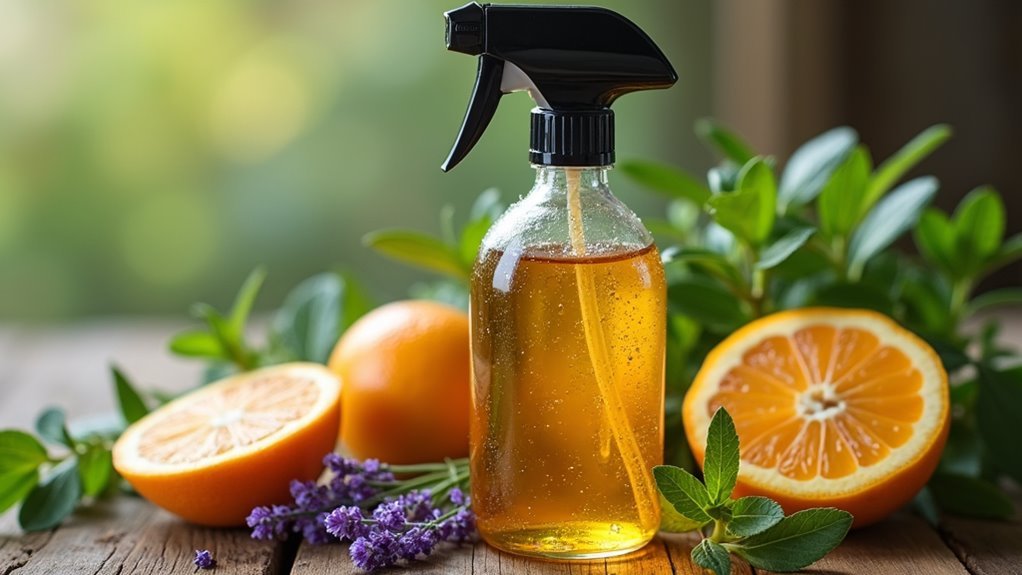You can create seven powerful organic bug sprays using simple household ingredients like vinegar and essential oils. Mix apple cider vinegar with water and citronella oil for personal protection, or blend white vinegar with water for garden perimeter defense. Steep herbs like rosemary or mint in vinegar for enhanced repellent properties, infuse citrus peels in white vinegar, or combine crushed garlic with apple cider vinegar for mosquito control. These natural solutions protect your family while the thorough formulas below reveal specific ratios and application techniques.
Apple Cider Vinegar and Essential Oil Spray Formula

Mosquitoes and flies can’t stand the pungent aroma of apple cider vinegar, making it an excellent foundation for homemade bug sprays.
You’ll create an effective natural bug spray by combining ACV’s odor-masking properties with powerful essential oils like citronella, eucalyptus, and lavender.
Mix equal parts apple cider vinegar and water in a spray bottle, then add 10-15 drops of your chosen essential oils. This simple formula creates a potent repellent that’s safe for children and pets.
Apply the mixture to exposed skin and clothing before heading outdoors.
While you’ll need to reapply this natural bug spray more frequently than chemical alternatives, it offers superior safety for long-term use with minimal skin irritation risks.
White Vinegar Garden Perimeter Defense Solution
While apple cider vinegar works well for personal protection, white vinegar offers a powerful solution for defending your entire garden space.
White vinegar creates an effective natural barrier that protects your entire garden from unwanted pests without harmful chemicals.
This effective natural insect repellent creates an invisible barrier around your garden’s perimeter that bugs won’t want to cross. The acetic acid’s strong odor repels many insects naturally, making it an excellent alternative to harmful chemicals.
You’ll need equal parts white vinegar and water mixed in a spray bottle for easy application.
Simply spray this solution around your garden’s edges to establish your defense line. Remember to reapply regularly, especially after rainfall, to maintain effectiveness.
This non-toxic approach protects your plants while preventing chemical contamination of your soil and surrounding vegetation, keeping your garden healthy and pest-free.
Herb-Infused Vinegar Bug Repellent Recipe

Creating your own herb-infused vinegar bug repellent combines the natural power of aromatic plants with vinegar’s proven insect-deterring properties.
You’ll steep herbs like rosemary, mint, or thyme in vinegar for 1-2 weeks, extracting their natural repelling compounds. The acetic acid disrupts insects’ scent detection abilities, making them less likely to approach treated areas.
Mix your herb-infused vinegar with water using a 1:1 ratio for safe skin application. You can enhance effectiveness by adding essential oils like citronella or eucalyptus to create a more potent blend.
Store the mixture in a spray bottle for easy application to exposed skin or clothing. This eco-friendly solution uses only organic ingredients, giving you effective protection without synthetic chemicals found in conventional bug repellents.
Citrus Peel Vinegar Insect Deterrent Blend
Several citrus fruits in your kitchen can transform into powerful natural insect deterrents when combined with vinegar. This citrus peel vinegar blend harnesses essential oils from orange, lemon, and lime peels, creating an effective non-toxic alternative to chemical pesticides.
The acetic acid in vinegar disrupts insects’ scent trails while citrus oils provide strong aromatic repellent properties.
Vinegar’s acetic acid breaks down insect navigation pathways while citrus essential oils create natural aromatic barriers that repel unwanted pests.
Creating this eco-friendly solution is remarkably simple:
- Collect citrus peels from oranges, lemons, limes, or grapefruits
- Submerge peels completely in white vinegar in a glass jar
- Steep the mixture for one week in a cool, dark place
- Strain the liquid and transfer to a spray bottle
- Apply directly to areas where insects gather or enter
You’ll reduce food waste while protecting your home from unwelcome pests naturally.
Garlic and Vinegar Anti-Mosquito Treatment

Garlic’s powerful sulfur compounds create another potent mosquito-fighting solution when paired with vinegar’s acidic punch. You’ll find this combination works by confusing mosquitoes’ host-detection abilities while masking your natural scent.
These homemade bug sprays can reduce mosquito attraction by up to 50%.
To create your treatment, blend crushed garlic cloves with apple cider vinegar and let it steep overnight. Strain the mixture and transfer it to a spray bottle for easy application. You can spray this solution directly on exposed skin or around outdoor seating areas.
For enhanced protection, consider consuming garlic regularly. Your body will excrete sulfur compounds through skin pores, creating an additional deterrent layer.
Both ingredients are completely non-toxic, making them safe for families with children and pets while remaining environmentally friendly.
Mint Vinegar Spray for Outdoor Protection
When you’re seeking reliable outdoor protection, mint vinegar spray delivers powerful pest-deterring properties through a simple combination of natural ingredients. This safe and effective solution harnesses mint’s menthol compounds to mask attractive scents while vinegar’s acidity creates an inhospitable environment for bugs.
You’ll find this organic alternative particularly useful to repel mosquitoes and other outdoor pests without exposing your family to harsh chemicals.
- Combine equal parts distilled water, vinegar, and peppermint essential oil in a spray bottle
- Apple cider vinegar provides antimicrobial properties that prevent potential bite infections
- Strong mint scent effectively masks odors that typically attract insects
- Safe for use around children and pets unlike chemical alternatives
- Reapply every 2-3 hours for maximum outdoor protection effectiveness
Multi-Purpose Vinegar Bug Barrier Solution
Multi-purpose vinegar bug barrier solutions expand beyond targeted outdoor protection to create thorough pest defense throughout your entire property.
You’ll harness acetic acid’s power to disrupt insect pheromones naturally, making your home less attractive to unwanted visitors. Simply dilute white vinegar with water and spray around entry points, windowsills, and garden perimeters to repel ants, spiders, and various crawling insects.
The vinegar’s strong scent masks appealing odors that typically draw bugs to your space.
You can enhance this multi-purpose vinegar solution by adding essential oils like peppermint or citronella, which boost repellent effectiveness while providing pleasant aromatics.
This eco-friendly approach eliminates chemical exposure concerns while maintaining powerful pest control. You’re creating a sustainable, non-toxic environment that protects your family and pets from both harmful pesticides and persistent insect problems.
Frequently Asked Questions
What Is the Most Effective Natural Bug Spray?
You’ll find lemon eucalyptus oil-based repellents most effective, as they’re CDC-endorsed and provide DEET-comparable protection. Look for products combining citronella, lemongrass, and rosemary with health scores above 79/100 for ideal results.
Why Was DEET Banned?
DEET wasn’t actually banned, but you’ve likely heard concerns about it. Studies showed it can cause skin irritation, neurological effects in children, and damage synthetic materials, prompting many to seek safer alternatives.
Which Is Less Toxic, DEET or Picaridin?
Picaridin’s less toxic than DEET. You’ll experience fewer skin reactions and adverse effects with picaridin. It’s safer for children over two months old and won’t damage your synthetic fabrics like DEET can.
Does Non-Toxic Bug Spray Work?
Non-toxic bug sprays can work, but you’ll likely need to reapply them more frequently than chemical alternatives. They’re most effective against some insects but won’t provide the same long-lasting protection as DEET.
In Summary
You’ve discovered seven powerful organic alternatives to chemical bug sprays that’ll protect your family and garden naturally. These vinegar-based solutions aren’t just effective—they’re safe, affordable, and easy to make at home. You can customize each recipe with your favorite essential oils and herbs while keeping harmful chemicals away from your loved ones. Start mixing these natural deterrents today and enjoy pest-free outdoor living without compromising your health or the environment.





Leave a Reply